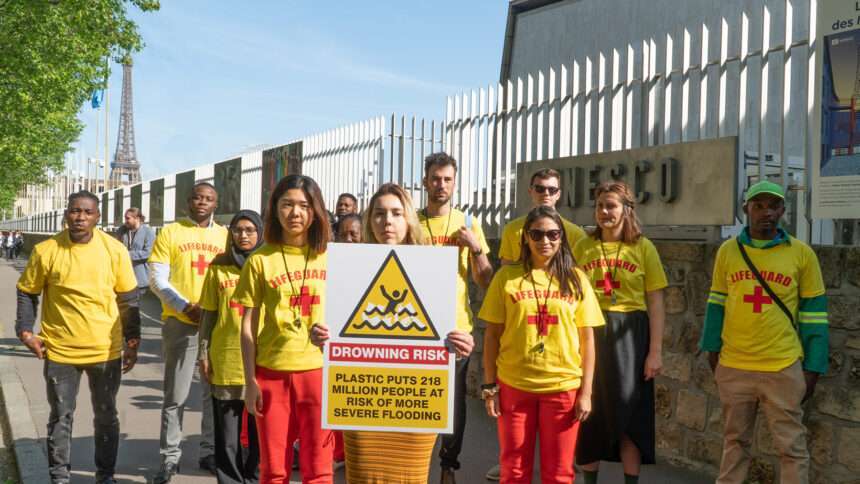Break Free From Plastics organizers and Alliance of International Waste Picker representatives organize lifeguard action outside UN Plastics Treaty talks. Photo credit: Tearfund/Adam Aucock
In recent years, the term Just Transition has swept across international environmental policy arenas, including the UNFCCC and most recently the UN Global Plastic Treaty talks. In the first iteration of the UNEP’s Zero Draft of the plastics treaty, waste worker unions successfully lobbied for the inclusion of Just Transition language. This draft calls on UN member states to “promote and facilitate a fair, equitable and inclusive transition for affected populations with special consideration for women and vulnerable groups including children and youth, in the implementation of this instrument.”
While it’s encouraging to witness inclusion of this language, compared to the 15+ years it took to have Just Transition mentioned in the (non-binding) preamble of the Paris Agreement – there are numerous critical issues that need to be addressed, to make this text meaningful and effective at both reducing pollution and supporting the communities and workers first and most impacted by the plastics-petrochemical industrial complex. Coming out of the pandemic, Just Transition Alliance (JTA) found itself drawn deeper into such UN policy arenas, where battles over the scope and definition of Just Transition have now begun.
We have been committed to supporting our sister alliances of the It Takes Roots coalition (IEN, GGJ, CJA, ICA, M4BL, La Via and the World March of Women) to advance Just Transition strategies at the UNFCCC. Additionally we recently started working with La Via Campesina (the international peasants movement) on UN climate and food policy; and, members of GAIA, BFFP, EJ Communities Against Plastics and Alliance of International Waste Pickers on the plastics treaty.
These are all opportunities to advance systemic change strategies led by frontline communities and workers, and we anticipate having to fight many of the larger institutions and corporate lobbyists at these arenas, so that just transition principles are upheld in regards to three pillars of our work:
1. Ensuring that neoliberal policies and corporate techno fixes such as pollution trading and offsets, climate-smart agriculture and chemical recycling are NOT subsidized. As we explained in Why Just Transition is the Opposite of Net Zero, we will not allow just transition to be greenwashed by coupling it with such harmful schemes.
2. Ensuring that the UN definition of just transition embodies one of our core values – that all environmental policy directives center the collective leadership and local self-determination of frontline communities and workers most impacted. And while the ILO has spoken up for rights of unions to be at the table, we need to remind our labor allies that “Nothing About Us, Without Us” was a rallying cry of our EJ movements that helped birth the concept of Just Transition.
3. Ensuring that industries and corporations profiteering from pollution are made to shoulder the burden of costs and compensation associated with the health, wellbeing and sustainable livelihoods of frontline workers and communities most impacted. While growing corporate control over the UNFCCC appears to limit possibilities at upcoming COP 28 negotiations, we remain hopeful that we can unite the global majority on this front, once we align the houses of EJ & Labor.
While these goals feel quite ambitious at these (late and early) stages of these policy battles, we are confident that with more EJ community groups and local unions getting involved with our efforts, we will succeed in winning these strategic steps towards a better world. Stay tuned!

